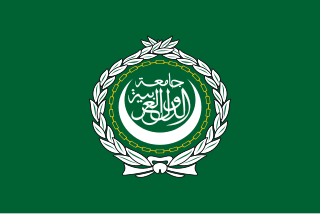
The Arab League, formally the League of Arab States, is a regional organization in the Arab world. The Arab League was formed in Cairo on 22 March 1945, initially with seven members: Egypt, Iraq, Transjordan, Lebanon, Saudi Arabia, Syria, and North Yemen. Currently, the League has 22 members.

The Arab world, formally the Arab homeland, also known as the Arab nation, the Arabsphere, or the Arab states, comprises a large group of countries, mainly located in Western Asia and Northern Africa. While the majority of people in the Arab world are ethnically Arab, there are also significant populations of other ethnic groups such as Berbers, Kurds, Somalis and Nubians, among other groups. Arabic is used as the lingua franca throughout the Arab world.

King Saud University is a public university in Riyadh, Saudi Arabia. Established in 1957 by King Saud bin Abdulalziz to address the country's skilled worker shortage, it is the first university in Saudi Arabia. It was known as Riyadh University from 1964 until it was reverted to its inceptive name in 1982. It was converted into an independent non-profit academic institution in 2023.

Payame Noor University is a public university in Iran, with its headquarters in Tehran. Established in 1988, is a legal body under the Ministry of Science, Research and Technology. Payame Noor means "the message of light" in Persian.

The Islamic World Educational, Scientific and Cultural Organization is a specialized organization that operates under the aegis of the Organization of Islamic Cooperation (OIC), and is concerned with fields of education, science, culture and communication in Islamic countries in order to support and strengthen relations among Member States. The Organization's headquarters is located in Rabat, Morocco, and its director general is Dr. Salim M. Almalik.

The Muslim World League is an international Islamic non-govermental organization based in Mecca, Saudi Arabia that promotes what it calls the true message of Islam by advancing moderate values that promote peace, tolerance and love.

Ekmeleddin Mehmet İhsanoğlu is a Turkish chemistry and science history professor, academician, diplomat and politician who was Secretary-General of the Organisation of Islamic Cooperation (OIC) from 2004 to 2014. He is also an author and editor of academic journals and advocate of intercultural dialogue.

Mohammad-Ali Taskhiri was an Iranian cleric and diplomat. During the 1980s, Taskhiri served as the Iranian representative to the Organisation of the Islamic Conference and was involved in promoting Iranian interests during the height of the Iran–Iraq War.

The Agence universitaire de la Francophonie is a global network of French-speaking higher-education and research institutions. Founded in Montreal, Quebec, Canada in 1961, as the Association des Universités Partiellement ou Entièrement de Langue Française (AUPELF), the AUF is a multilateral institution supporting co-operation and solidarity among French-speaking universities and institutions. It operates in French-speaking and non-speaking countries of Africa, the Arab world, Southeast Asia, North and South America, Polynesia, the Caribbean, Central, Eastern and Western Europe. As of 2020, the AUF has 1,007 members distributed throughout francophone countries on six continents. It is active in 119 countries, and represented by regional offices and information centers on campuses and in institutes. The Association receives funding from the Organisation internationale de la Francophonie (OIF), and its headquarters are located at the Université de Montréal, Quebec.
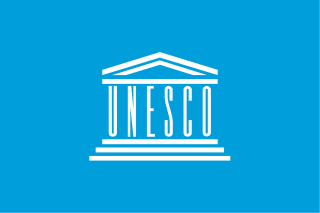
The United Nations Educational, Scientific and Cultural Organization is a specialized agency of the United Nations (UN) with the aim of promoting world peace and security through international cooperation in education, arts, sciences and culture. It has 194 member states and 12 associate members, as well as partners in the non-governmental, intergovernmental and private sector. Headquartered in Paris, France, UNESCO has 53 regional field offices and 199 national commissions.
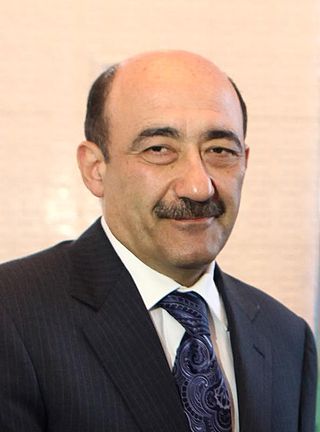
Abulfas Mursal oglu Garayev is an Azerbaijani politician, who served as the Minister of Culture of Azerbaijan.
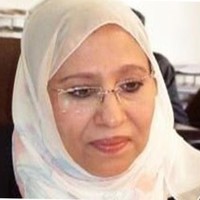
Huda al-Ban is a Yemeni politician. She was Yemen's Minister of Human Rights until 20 March 2011, when she resigned in protest to the government's sniper attacks on protesters during the 2011 Yemen protests.

Princess Nourah Bint Abdulrahman University, formerly Riyadh University for Women, is a public women's university in Riyadh, Saudi Arabia. It is the largest women's university in the world. Established in 1970 during the reign of King Faisal bin Abdulalziz, it assumed its current name in 2008 when it was granted university status by King Abdullah bin Abdulaziz and is named after Noura bint Abdul Rahman, elder sister and adviser of King Abdulaziz ibn Saud and the eldest daughter of Abdul Rahman bin Faisal, the last emir of the Second Saudi State.

The International University of Africa is a private university in Khartoum, Sudan. It is a member of the Federation of the Universities of the Islamic World. The university has faculties of Education and Humanities, Shariah and Islamic Studies, of Pure and Applied Sciences, Engineering and Medicine.
The League of Islamic Universities is an association of Islamic universities. It is based in Cairo. The chairman is Abdallah Ben Abdel Mohsen At-Turki, who is also general secretary of the Muslim World League.

The Arab Regional Centre for World Heritage is a Category 2 Centre under the auspices of UNESCO. founded as an autonomous and independent Bahraini public institution in 2010.
The World forum on Intercultural dialogue is an international forum held in the Republic of Azerbaijan since 2011 to establish an effective and efficient dialogue between cultures and civilizations. Based on the Baku process and related declaration in 2008.
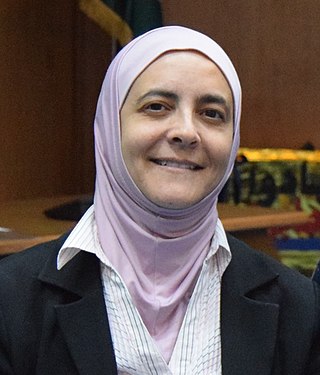
Rana Dajani is a Jordanian molecular biologist and tenured professor of biology and biotechnology at Hashemite University. She earned her Ph.D. in molecular biology from the University of Iowa. Dajani is an expert on genetics of Circassian and Chechen populations in Jordan, also on conducting genome-wide association studies on diabetes and cancer on stem cells. Her work in stem cell research initiated the development of the Stem Cell Research Ethics Law and all regulations in Jordan. She is an advocate for the biological evolution theory in relation to the religion of Islam, and believes strongly in the education and empowerment of women, being a member of the United Nations Women Jordan Advisory Council. She is the recipient of the Jordan's Order of Al Hussein for Distinguished Contributions of the Second Class.

Prof. Moudi A. Al-Humoud, is currently the Founding Administrative Board, Chair of Abdullah Al-Salem University in Kuwait and she is a professor of management at the College of Business Administration, Kuwait University. She served as president of Arab Open University, a pan Arab university operating in Kuwait, Kingdom of Saudi Arabia, Oman, Bahrain, Jordan, Lebanon, Egypt, Sudan and Palestine.
Fawzia Abd Al-Minem Al-Ashmawi is an Egyptian academic, writer and translator. She works as a Professor of Arabic Literature and Islamic Civilisation in the University of Geneva. She had won the Golden Award in Sciences and Arts from Egypt.
















